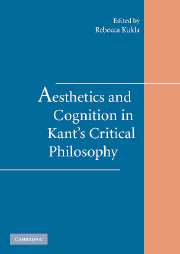Book contents
- Frontmatter
- Contents
- Notes on Contributors
- Acknowledgments
- 1 Introduction: Placing the Aesthetic in Kant's Critical Epistemology
- PART I SENSIBLE PARTICULARS AND DISCURSIVE JUDGMENT
- PART II THE COGNITIVE STRUCTURE OF AESTHETIC JUDGMENT
- PART III CREATIVITY, COMMUNITY, AND REFLECTIVE JUDGMENT
- 9 Reflection, Reflective Judgment, and Aesthetic Exemplarity
- 10 Understanding Aestheticized
- 11 Unearthing the Wonder: A “Post-Kantian” Paradigm in Kant's Critique of Judgment
- Bibliography
- Index
11 - Unearthing the Wonder: A “Post-Kantian” Paradigm in Kant's Critique of Judgment
Published online by Cambridge University Press: 24 July 2009
- Frontmatter
- Contents
- Notes on Contributors
- Acknowledgments
- 1 Introduction: Placing the Aesthetic in Kant's Critical Epistemology
- PART I SENSIBLE PARTICULARS AND DISCURSIVE JUDGMENT
- PART II THE COGNITIVE STRUCTURE OF AESTHETIC JUDGMENT
- PART III CREATIVITY, COMMUNITY, AND REFLECTIVE JUDGMENT
- 9 Reflection, Reflective Judgment, and Aesthetic Exemplarity
- 10 Understanding Aestheticized
- 11 Unearthing the Wonder: A “Post-Kantian” Paradigm in Kant's Critique of Judgment
- Bibliography
- Index
Summary
SELF-CRITICAL NOTE
There are moments when even the most rarified philosophical texts betray a certain helplessness on the part of their creators – helplessness that is not mere confusion or folly, but a kind of rational desperation occasioned by the authors' discovery that without their intentions, or even against their will, something foreign and unsought, yet intelligent, is surging into their philosophy.
Hume wrote feelingly of this experience in the Conclusion to Book I of his Treatise. Plato, in the Phaedrus, made it a condition for philosophy, when the sight of the beloved “knocks” the wandering soul out of itself (ekplêttontai kai ouketi hautôn gignontai, 250a7). Aristotle helpfully de-eroticizes Platonic ekplexia into thaumasia, the “wonder” with which philosophy begins (Metaphysics I.2, 982b12). At such moments the philosopher loses dominance and gives way. But to what, other than philosophy itself? Philosophy is not always an intentional production of the human intellect, then. Sometimes it just happens. When it does, if Aristotle is right, it happens as a wonder (thauma).
As Daniel Dahlstrom has noted, Kant too writes of thaumasia – when, in the Introduction to the Critique of the Power of Judgment, he invokes the “quite noticeable pleasure, even wonder” (Bewunderung) that we fall into when nature shows us a contingent unification of two or more empirical laws. To be sure, Kant relates this feeling to empirical research rather than to philosophy; it is occasioned by something one finds rather than something one produces.
- Type
- Chapter
- Information
- Aesthetics and Cognition in Kant's Critical Philosophy , pp. 266 - 290Publisher: Cambridge University PressPrint publication year: 2006



